The mission of CIONET is to create a platform to promote and facilitate the exchange of ideas amongst CIOs. Peer to peer. CIONET wants to enable digital leaders to plug into the wisdom of the IT crowd to help them solve their problems and deal with their burning issues.
The war for digital talent is undoubtedly one of these. That war has never been so fierce. Due to the evolution of technology. Due to the digital transformation of our companies and society. The context has changed as well. COVID has introduced a new way of working, making national and international boundaries nearly irrelevant. The impact on the digital labour market is clear: on the demand side, where companies and organisations must rethink their HR strategies, and on the supply side, where job seekers show different attitudes and expectations.
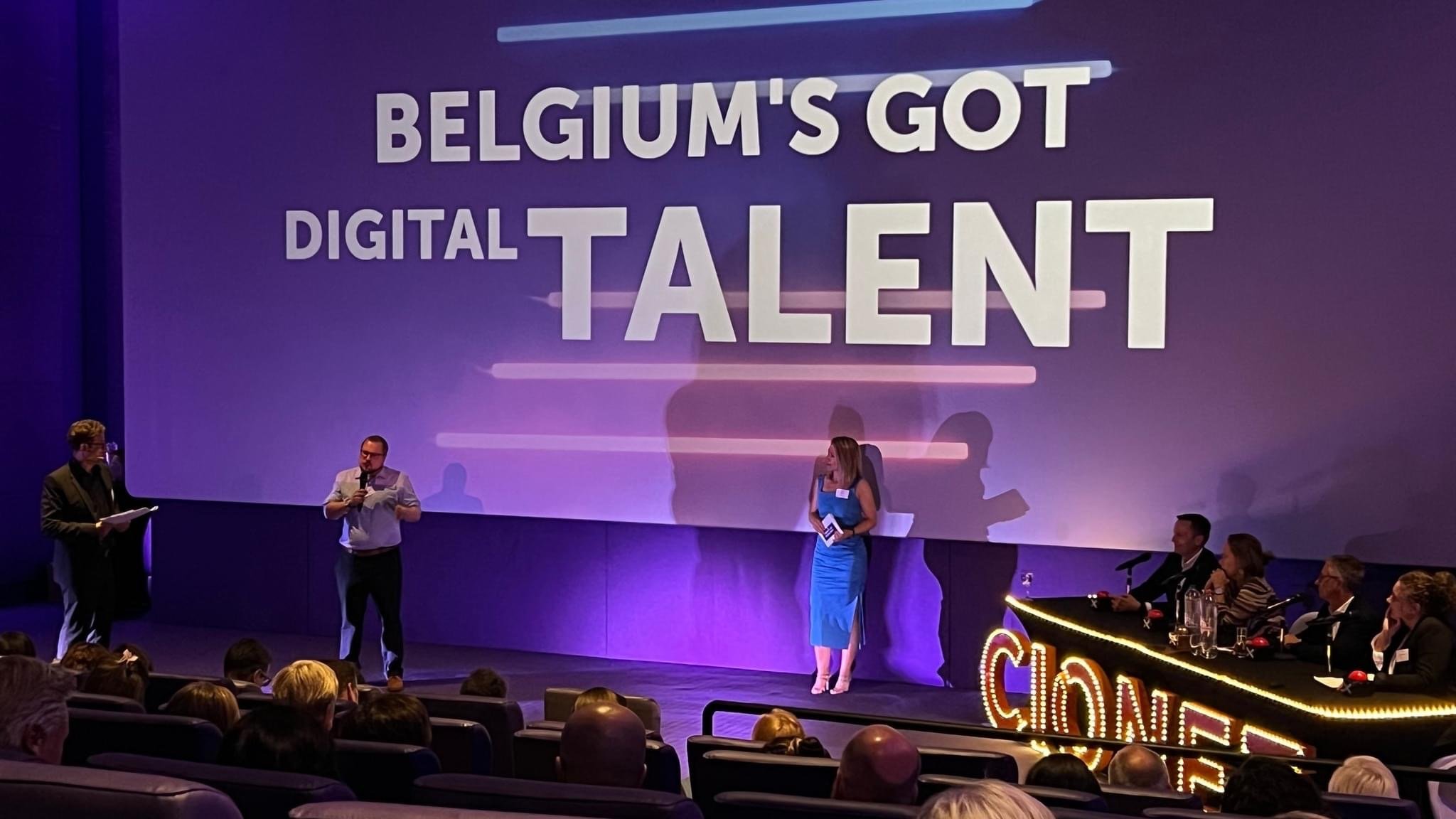
So we invited both sides on stage. On one side: the candidates, youngsters, young graduates, and freelancers to talk about their choices, hopes and expectations about 'working'. And on the other side: a panel of IT and HR executives to listen, interact with them and give their vision on how they are or would like to be dealing with these changes.
- The 214.000 open vacancies in Belgium counted in the first quarter of 2022;
- The top three areas of digital skills shortage being enterprise architecture, cyber
security and analytics;
- The fact that 72% of organisations claim that skills shortage prevents them from
keeping up with the pace of change.
- The statement that 56% of the youngsters said they quit a job if it prevents them
from enjoying life.
The shortage of digital talent is here to stay, as to Ronny, so we better adapt our recruitment and retainment tactics and become proactive, open-minded and empathic to what the new generation is looking for. The latter contains – apart from a correct salary - clearly qualitative
aspects such as mobility in working, next to a purposeful company culture and strong leadership. “Flexibility is indeed a must”, as to Ronny, “but make sure to preserve the personality, the DNA of your company, as this is after all what makes people engage with your organisation”.
After this introduction, young digital talent was called on stage to testify about their personal and professional choices, each representing a trend or topical issue that characterises the current context of the war for talent.
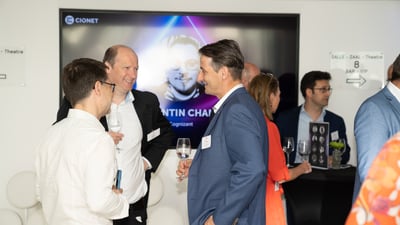
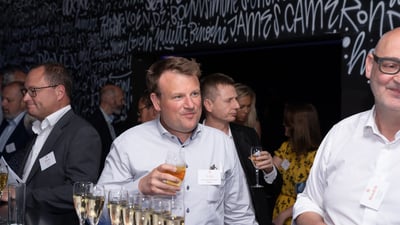
The first panel session was launched with a testimony of Rémy-Baptiste, 26 years old, trained and having worked for four years as an auditor in finance and insurances, who decided to take another route and go for an IT career. The ICT integrator NRB welcomed him to start in its BI and Data Management team. Next came Florence, a young Muslim girl who succeeded in entering the world of digital marketing thanks to the courses and coaching of organisations such as Molengeek and Girleek. Gitte, a young Master in Media & information
design, now finalising her studies in Design for Impact (visualisation and data storytelling), determined not to apply for a payroll job but only to look for freelance projects. And finally, Hélène and Maureen, both students in Business engineering, option Management Information Systems at the University of Antwerp: Hélène finishing her last year and signing up for her first job, Maureen in her 3rd year and involved in a students' organisation allowing students to get acquainted with the corporate world.
All made it clear that current generations are more selective and picky than former ones. There is their need for freedom after COVID times. Moreover, they realise they have plenty of choices and thus feel quite comfortable to selectively explore the labour market for the right job that can offer them a purpose and the work-life balance they are looking for.
“Gitte is an example of a youngster who not only chooses but creates her own roadmap. She is creating a new type of job that will most probably be recognised in the future as essential” - Wim Nagels, CIO DPD.
The IT and HR executives in the panel showed great empathy towards these youngsters. They unanimously agreed that companies can no longer just offer ‘a job’ to new talent. Instead, they must offer adequate, meaningful career perspectives matching individual skills
and ambitions. IT jobs, in particular, demand a different approach. Whereas in earlier days, IT- jobs were seen as purely technical jobs requiring a technical education, today – because of evolutions such as low code/no code, power apps and AI - these digital jobs have become accessible to people with a pure business background. The latter can even have an advantage as a good business understanding completed with technical training forms a vital asset for a big part of contemporary digital roles. Moreover, due to digital evolutions, new
jobs or roles are being created. Functions and people, therefore, need to be dynamically managed ‘on the fly to continuously ensure the match between current and future needs and talents.
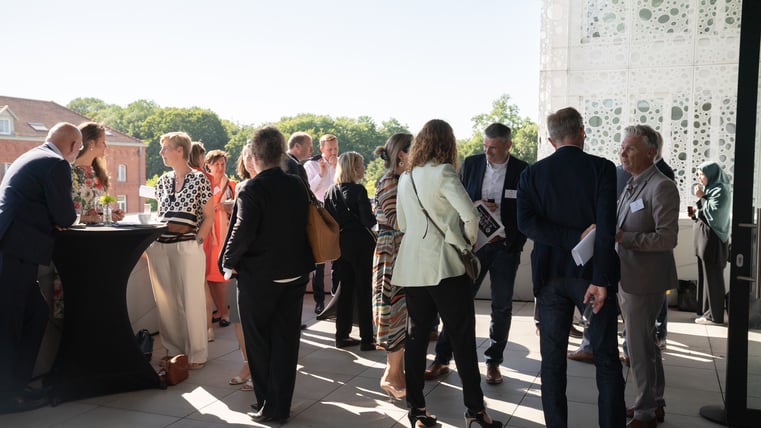
“When managing people, one can no longer make any distinction based on the type of contract; they are all people, valuable digital talents we all desperately need” - Jan Dobbenie, CIO VDAB.
Furthermore, to acquire the necessary digital capacities, companies – private or public - need to tap into all sources of talent through different channels and manage a diversified mix of contractual commitments. This mix reflects the changes in attitudes and the diversity in the current digital labour market in which some talents prefer to subscribe to the Gig economy and work on short individual projects whenever and wherever they want, while others go for a life as a freelancer working on projects over longer periods, next to those who opt for the classical payroll formula. Yet, traditional corporate governance processes and management structures seem to be getting in the way by moments. Where certain talents are managed by procurement, others are governed by the CIO and the IT Leadership team, and payroll collaborators are managed by the HR department, strange – sometimes even counter-productive people management practices can appear, as was illustrated by one CIO revealing that in his organisation some of the colleagues received Easter eggs whereas others, sitting next to them, did not, for the simple reason that they were on a different type of contract.
"Companies need a holistic view, they need to invest in 'total talent management' - Peter De Buck, HR Tech entrepreneur.
The discussion of whether the growing share of freelancers on the market is a good thing or not, whether the motivation of these freelancers is based on the urge for freedom and flexibility, or rather on the fiscal aspects of the statute, these discussions are, after all, not
that relevant anymore. It is the new reality and companies better deal with it. They should proactively develop an HR strategy to cope with it.
“As a wise women once said: ‘Diversity is being invited to the party, inclusivity is being able to dance at the party’. It’s important to offer people a welcoming environment where they can be themselves.” – Elke Laeremans, CIO Schoenen Torfs.
Diversity, in contractual formats and professional choices, next to diversity and inclusivity in the social sense of the word, is more than a (political) choice or corporate policy. It will enrich the organisation and make it better fit and respond to a diversified and rapidly evolving customer- or citizen base.
The second session was kicked off by Corentin, who worked for six years in an academic research function in sociology and anthropology before making a career move into the digital world of Cognizant. Another impressive testimonial was given by Hala, who was born in Egypt, studied in Italy and recently joined Euroclear in Belgium. According to Hala “The multi-cultural environment and the perspective of having a work environment where one’s professional growth and personal integration go hand-in-hand”, convinced her to become a “newbie” DevOps Engineer at Euroclear.
And thirdly came Jenny Björcklöf on stage, pure bread digital nomad and manager of the Belgian Community of Freelancers in Belgium. The last testimony was a video of Arthur Franckx, a 13-year-old boy from Antwerp, a secondary school student and an ambassador of CODERDOJO, the global network of coding clubs for young people led by free volunteers.
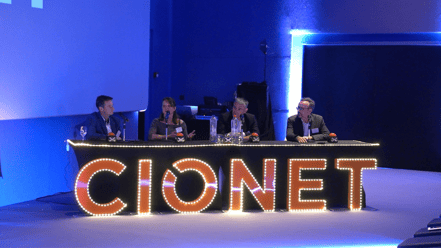
The panellist clearly recognised that today's playing field for recruiting digital talents is more
than ever an international one. Remote working took away the geographical boundaries. Companies with international activities or customer bases must reflect this international orientation in their teams. It is a must, not only in terms of language skills but also in terms of cultural diversity. Still, here again, the variety of legal frameworks in different countries often creates severe constraints. And indeed, cultural differences can sometimes cause difficulties, and things get 'lost in translation', but according to our panel members, companies simply need to recognise it and pro-actively deal with it.
“At Euroclear we have around 80 different nationalities. To deal with cultural differences, one needs to be very mindful and empathic. Check the context, communicate intensely, make the effort to understand each other well , and you will overcome the differences. It will become an enrichment for your work environment.” - Michal Paprocki, Group CIO Euroclear.
And as to our youngest future digital talent and the CODERDOJO programs; the enthusiasm for this type of programs was commonly shared as they all believe that this sort of initiative is essential to introduce school kids to technology and enhance their capability for analytical thinking. Digital is, after all, not just a technology. It is a way of thinking. Showing its potential certainly can inspire and motivate youngsters to make the professional choices the whole society is in great need of.
Special thanks go to:
The candidates – digital (current and future) talent:
- Rémy-Baptiste Delhez
- Gitte Vande Graveele
- Hala Mostafa
- Corentin Chanet
- Florence Monnaie
- Hélène Truyers
- Maureen Hellemans
The members of the panels:
- Peter De Buck, HR Tech entrepreneur Connecting Expertise, Lancr, Dibbs.be
- Ariane Berckmoes, CTO Federale Assurance-Verzekering
- Wim Nagels, CIO DPD
- Michał Paprocki., Group CIO Euroclear
- Liesbeth Van Malderghem, HR Transformation Leader, Deloitte
- Elke Laeremans, CIO Torfs
- Jan Dobbenie, CIO VDAB
- Luc Hendrikx, CEO CIONET
.png)




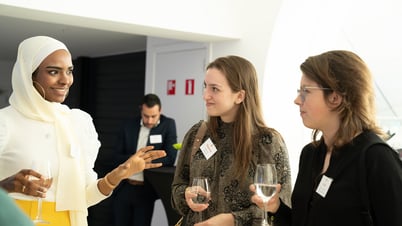

No Comments Yet
Let us know what you think